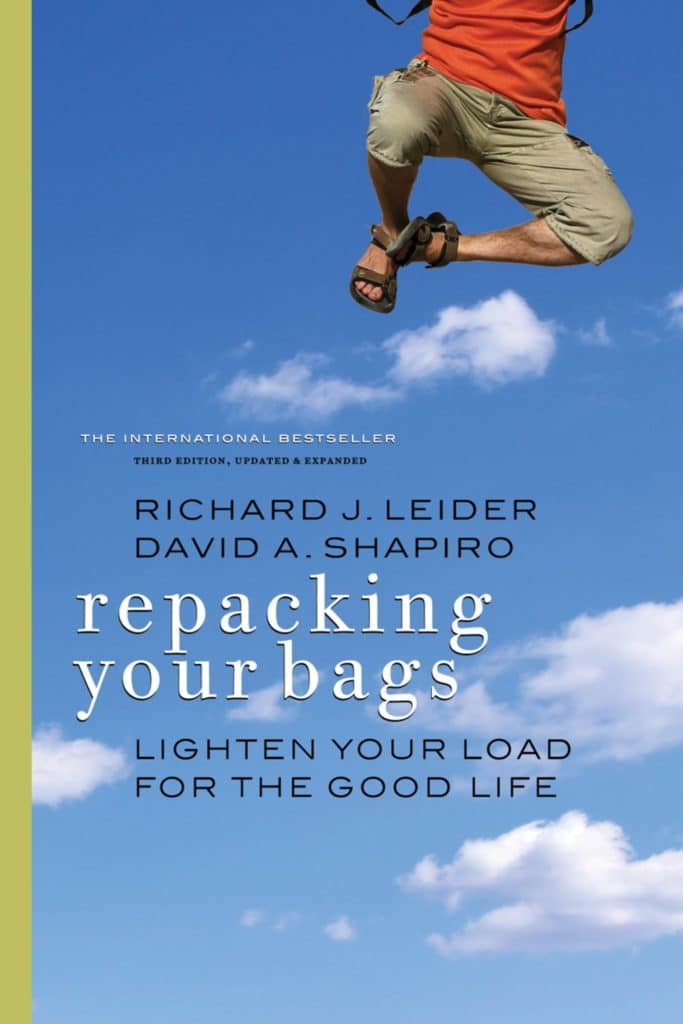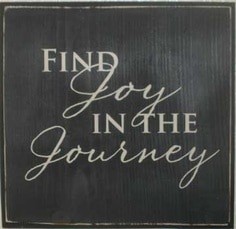Warning: Undefined array key 1 in /var/www/wp-content/plugins/monarch/monarch.php on line 4359
By Diana Creel Elarde
For years we may have led structured lives with disciplined schedules. But in retirement, do those schedules help or hinder our lives? There are those of us, such as me, who find an open-spaced calendar almost a frightening option. Daily or weekly or monthly goals may have driven us through the working years, but are they still relevant in retirement?
Imagine coupling a goal-oriented person (me) with one (husband) who is more inclined to be about the process especially in retirement. Every minute for him is about the journey, without a goal in sight. Can this combination of process/journey focus versus goal orientation come to a happy middle ground now that we are spending more time together? Thus arises the question: Should the retirement journey be more of a process or a goal?
Image via Amazon
Years ago I heard Richard J. Leider, co-author of the book Repacking Your Bags: Lighten Your Load for the Rest of your Life, speak on a talk show about his experience with his daughter on the Road to Hana. For those who don’t know, the Road to Hana is approximately 60 miles of winding Hawaii roads with hairpin turns, listed as a must-see for all visitors to Maui.
Their story starts with the evaluation of spending eight hours on a long trek up a winding mountain road. Looking at the mileage involved, his daughter and he concluded they could make it in much less time than it took others. As their trek began so did the curves in the road, but their determined attitude drove them to push ahead where others seemed to be taking their time. Along the way they observed cars parked to the side of the road, nodding in agreement to each other that they didn’t have to stop. Their goal: master this road, take the bends quickly and return to the beach by afternoon. Somewhere around the 25th hairpin turn his daughter told him she was feeling car sick, but that they should power through! Finally, after about 575 more hairpin turns, the destination of Hana is reached!
Exploring the town was nothing short of disappointment and for the life of them they could not figure out what all the fuss was about over coming to Hana. Dejected with headaches and upset stomachs they decided some food might help before attempting the road back. All around them in the restaurant they heard light voices filled with laughter and happy memories, relating the gorgeous waterfalls, the overlooks of the ocean and swimming in tropical ponds. Turning to Leider, his daughter observed, “Dad, we missed the Road to Hana.”
Are you missing your journey?
How many times have we been more concerned with the goal and missed the journey? For me this is a tough one as I am overwhelmingly goal-oriented. Getting to the end, the goal, has always driven my life. Sometimes I feel like one of those wind-up dolls – wind me up, point me in a direction and watch me go! Blinders on, the goal in mind, I am headed out. But how do I deal with this now that the days are more relaxed and the calendar isn’t jammed pack?
What makes her goal-oriented?
- Tend to find great satisfaction in finishing the task at hand
- Decision making for most part comes quickly and then they move
- Quickly organize and form a plan
- Can be single-minded, all effort to the goal
- May be more futuristic than present-moment oriented
Image via Plan Your Meeting
Granted my goal-orientation has served me well in many stages of my life, especially during those corporate and children-raising years. But in the first big retirement trip, my goal-oriented nature nearly derailed our driving adventure through Ireland. Map in hand, daily we drove from one historic destination to another (a great way to go!) The idea being along the way to be able to see the sites we were interested in. My map was filled with destinations to explore, but I found myself at each stop counting the minutes until we could get back in the car and get to the next stop.
The ultimate end point each day was of course, reaching the destination where we had reservations to spend the night. Similar to Leider and his daughter, I was missing the joy of fully experiencing sites I wanted to see all my life. I was missing the beauty of the journey in Ireland because of my goal-oriented behavior.
Are you missing your goal?
Now life, in its wisdom or folly, graced me with a husband who is process-oriented. Typical of process-oriented people he loves the planning, the developing and the eventual (or not) getting to the goal. It is all about the journey, or maybe even getting ready for the journey. In our retirement ventures I want to spend the minimum time planning, while he prefers each detail is looked over.
What makes him process-oriented?
- Will take time to decide on a framework or criteria before proceeding
- Tends to enjoy what they learn from working the process
- Likes to explain/tell what is learned along the way
- Will explore in present time and examine what is at a precise moment
- Sometimes (or many times!) getting to the goal is optional
I like to say in day-to-day life the man wanders around on some kind of squiggly line. Here is how it can manifest itself trying to get to an event or a planned outing.
Image via The Life Center
We (well, actually I) determine we will leave the house at 2:00 pm. Precisely at 1:45 pm I am hovering around the door because in my world if you are not 15 minutes early, then you are late (granted a belief I probably need to work on). At 2:00 pm my husband emerges from the hidden corners of his office. Things are looking good, but wait there is more! “I need to check that the garden got watered before we leave” he informs me. Actually please feel free to substitute “computer is off, empty the washer, and/or put out the trash”.
But it doesn’t stop there – wouldn’t it be great to take some things on our journey out? How about a snack, that hat that can’t be found, a bottle of water and ……. The squiggly line between his office and the back door gets longer and the projects multiply. I usually get through the first few sidetracks in a calm manner, but by the fifth stop and it now being 2:15 pm I have lost composure. My goal-oriented self is screaming for order and I am hoping those screams are not leaving the confines of my mind. A process-oriented person understands and probably appreciates this pattern in a way that is confusing to me. He tells me he likes to make sure all the “I’s” are dotted and the “T’s” are crossed.
Long trips for him are moment to moment ventures, with many stops along the way. It is about the leisurely breakfast, the looking over of the route or the alternative route and perhaps a second or third cup of coffee. Every historical stop is an opportunity for him to learn more than what the small brochure provides as he wanders deeper and wider. Don’t get me started on the actual stopping at the visitor center to pickup said brochures and/or the in-depth visit through the museum. For him this is what a leisurely trip in retirement should look like. In my camp, I begin to feel like a failed sheep dog trying to herd the flock. Granted there is only one of him to move towards the car, but there are times when it feels like a multitude!
Give a little, get a little
There can be little doubt that giving up my goal-oriented behavior would be akin to a ship crashing upon visible rocks. No way a good outcome! And how would I even relate to myself if I wasn’t this on-time, reach-the-goal person? I built my life, my livelihood, on being that dependable person always early.
And for an engineer like him, rushing straight into an endeavor without first considering the overall picture and planning for eventualities is hardly a possibility for his processed-oriented mind. Drop everything and leave the house? Not likely!
But now that we are spending more time together we needed a peaceful solution so our retirement years wouldn’t be spend in a tug-of-war battle. In a solution-oriented discussion we came up with these agreements to help us remain friends.
Image via Pacific Wave Jiu-Jitsu
-
- If it is my event, then the agreement is we will leave on time.
- If it his event, my task is to stay calm and work within his schedule.
- In large item purchases his slow process makes for a better overall decision.
- Finally, to take a moment of evaluation and appreciation, would the other person’s method work best in the current situation?
I have actually learned to appreciate the fact that with his wandering process-oriented mind there are moments he will observe and catch something which I would miss in my attempts to streamline right to the goal. Sometimes magic is afoot and stopping to watch the flow of a beautiful spring butterfly or hummingbird in the garden is worth staying in the present moment.
Similar to our day-to day routine, we also implemented some agreements when it comes to travel. One important one, there are days when it is all about the journey and there are days when it is about the goals, the predetermined destinations. This seems to work since I haven’t had the urge to leave him in a visitor’s center somewhere and continue my retired days oriented only to my goals.
Goal-oriented or process-oriented, have you ever considered which you are? Taking a moment to identify these traits in yourself or your partner may be the best strategy to understand how to use each other’s gifts for the benefit of the relationship, especially in retirement!
And if by chance you find yourself on the Road to Hana remember its best appreciated when it is about the journey, not the goal.
Diana Creel Elarde is a PSYCH-K® facilitator, author of the book, A Star in My Hand, and a three-time contributing author in the Chicken Soup for the Soul books. You can reach Diana at www.emerginginsightsgroup.com or at diana@insight11.com.
Process/Goal – Copyright DElarde, 2018
I’m a self-professed madman, adventurer, photographer, certified High-Performance Coach, martial artist, and licensed physical trainer specializing in senior fitness. My passion is to continue growing and developing into my own unique, gifted, and joyful authenticity, while committing myself towards doing my own special part to help change the world. My mission is to help others find their own direction and purpose in life, by means of mentoring, teaching, and empowering.










